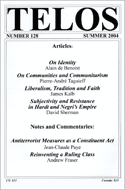On Tuesdays at the TELOSscope blog, we highlight a past Telos article whose critical insights continue to illuminate our thinking and challenge our assumptions. Today, Maxwell Woods looks at Alain de Benoist’s “On Identity,” from Telos 128 (Summer 2004).
 The demand for identity and the difficulty of answering the seemingly innocuous question “Who am I?” persists throughout the world in the material form of nationalism. The French government targets the Roma as an ethnic group for expulsion, the minister-president of Bavaria proclaims that foreign workers from other cultures are not needed, and recent Arizona legislation demands that all aliens in the state must carry registration documentation at all times—all, in their simplified forms, are broad statements of identity: I am French, Bavarian, American, etc. This renewed nationalist identity, which many assumed had died in the post-Nazi and postcolonial epoch, contradicts the prevailing multicultural ideology that has dominated Europe. Yet this reemergence of collective identities could be previewed in the very process of identity’s reconceptualization in modernity’s individualist ideology. Alain de Benoist’s article “On Identity” defines identity in a historical dialectic, and contends that the seemingly antithetical positions of the modern individual liberated from his past and the essentialist notion that humanity’s fate is determined from the start are in fact two sides of the same coin. We must cast aside these positions and begin to understand identity as a dynamic process of becoming wherein we freely choose who we are while, simultaneously, who we choose to be is limited by our objective reality.
The demand for identity and the difficulty of answering the seemingly innocuous question “Who am I?” persists throughout the world in the material form of nationalism. The French government targets the Roma as an ethnic group for expulsion, the minister-president of Bavaria proclaims that foreign workers from other cultures are not needed, and recent Arizona legislation demands that all aliens in the state must carry registration documentation at all times—all, in their simplified forms, are broad statements of identity: I am French, Bavarian, American, etc. This renewed nationalist identity, which many assumed had died in the post-Nazi and postcolonial epoch, contradicts the prevailing multicultural ideology that has dominated Europe. Yet this reemergence of collective identities could be previewed in the very process of identity’s reconceptualization in modernity’s individualist ideology. Alain de Benoist’s article “On Identity” defines identity in a historical dialectic, and contends that the seemingly antithetical positions of the modern individual liberated from his past and the essentialist notion that humanity’s fate is determined from the start are in fact two sides of the same coin. We must cast aside these positions and begin to understand identity as a dynamic process of becoming wherein we freely choose who we are while, simultaneously, who we choose to be is limited by our objective reality.


